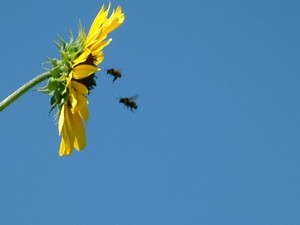09 Apr Thu 2009
March from Water
Recently while on deliveries, we noticed a farmer in the valley who was carrying on a trailer a sign bearing the message that water was essential for farms. We didn't get the chance to talk with him - he was going the other direction at more than a mile per minute - but we had to laugh when we imagined his impression of the beautiful farms of the desert, or of those so-called "less fortunate" farms without water.
While it is true that water is necessary in most of California for the most popular foods in demand, it is important to remember that water is not needed for food itself. Many wild plants and fungi grow without any help from human hands that are edible, nutritous staples of the human diet, delicious treats, energy, fiber and medicine. Many animals grow - without help from human hands - that produce necessary fiber, food, medicine, treats and draft power.
It is inconcievable to suppose that huamnity would have thrived so long and so well on this planet if there was not enough food to do so, and a sin to doubt that the good earth cannot continue to provide for our needs. As one of our customers pointed out to us ina discussion on the subject, "it is our own fault if we are hungry in this world of plenty."
Farmers depend on others for their livelihood. We depend on our laborers to work hard, we depend on our customers to tell us what they want. But we also depend on either nature for water - or upon our government. That the drought is causing so much concern among farmers for water demonstrates that they have not only sinned by fearing for their customers' hunger, but that they are dependent upon unnatural governmental action for their water.
At every meal before we eat, we take a moment to remember that all things are given to those who need them when they are needed most. Though we do enjoy our cabbages - a water loving plant - we also enjoy our dandelions, our dates, our oats, our beans, our squashes... the innumerable other things that require less or no water.
We take a moment to remember that irrigation improves yields of these foods, but is not necessary for their production, and that the total production is not incresaed more than the value of that water. Even if we had access to subsidized water from a ditch (our well would not be subsidized by taxpayers), it still would not change the basic fact that the water is not producing more food than it is worth. The water belongs to the river and the city, as the farmer does: the farmer serves their nation by protecting natural resources and providing food to their neighbors.
It is this unwillingness to serve nature and their neighbors that has led to this agricultural crisis. Do we continue to produce oranges when there is no water to do so, when other fruits are more wholesome? Do we listen to our customers when they - out of ignorance - demand that which would strip their children's children of a great inheritance?
Many farmers say yes. They carry signs. They are terrified to produce against market demand, afraid that their customers will buy somewhere else. They are terrified that if they do the right thing they will be punished.
We at Re Rustica are now at a crisis of our own. How can we produce those foods which endanger our water resources? How can we afford the risk of our customers preferring to buy from those farms which would not look after the earth as much as the market demand?
And our customers are in crisis too: the desert's foods, while less expensive, are less demanded for lack of familiarity. The customers simply don't know they want them - when would they have tried them? How can the customer risk trying them - supporting a farm with their limited money - when they don't even know they will like what they buy?
Together we stand in the sin of doubt, the correct path laid before us, waivering as if there was reason for confusion. Drought will destroy us if we choose wrongly or hesitate too long.
As we write this, our coyote friend - who hunts in our fields - is playing friendfully with our geese. After a long time of distrust, they have come to terms of friendship. Through our help there is plenty of good food for the coyote, and our geese have no reason to fear him. We work along side him - though he is not tame. By confronting our fears, our courage earns us greater rewards than we could have imagined.
And so we ask you, our customers and friends and our fellow farmers, how can we lead each other towards what we must do? We, on our part, provide free samples of desrt foods and foods that need less water (though they are not asked for, we do provide them periodically to our customers). When we occasionally and radomly follow up as to why they are not ordered again, it is because they are not the foods they are familiar with.
How can we work together to ensure that there will never again be a drought crisis? To ensure that farmers never need to fear for lack of water? How can we bring these foods to be an essential part of the daily diet? These foods are loveable and nutritious, enjoyed throughout other parts of the world. Why can't they be enjoyed here?

